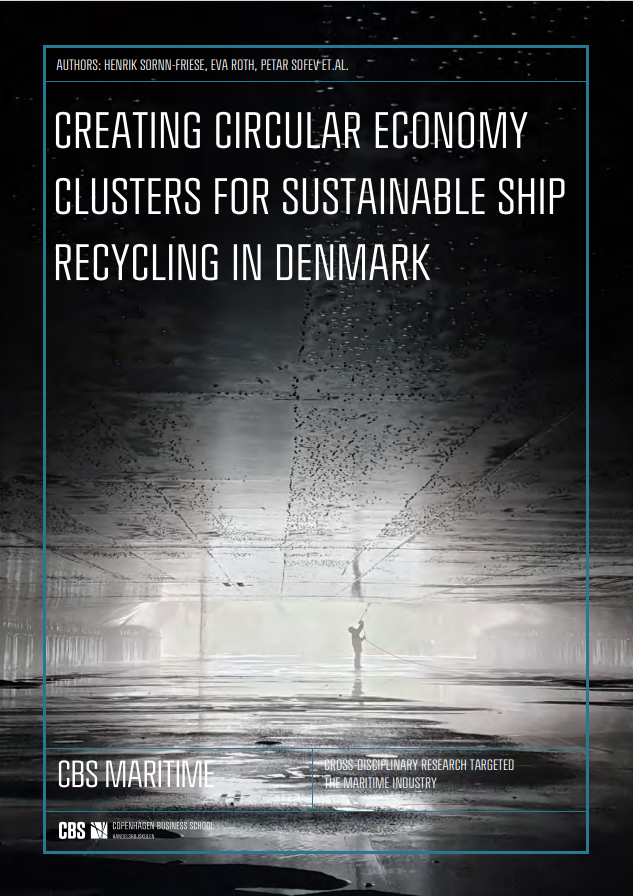The Sustainable Shipping Initiative (SSI) has today published the report Exploring shipping’s transition to a circular industry, discussing the potential of circular economy principles for shipping and identifying four main building blocks: knowledge and awareness, business model innovation, technological advancement, and a global regulatory framework.
As shipping undergoes rapid shifts in the coming decades to achieve its decarbonisation and sustainability goals, now is the time to rethink the industry’s approach to resource use and consider the entire lifecycle of a vessel in its design, building, operations and recycling phases. Authored by sustainability and circularity consultancy 2BHonest, the report points to the potential for circularity principles to enable the transition to a sustainable shipping industry.
Over 95% of current lifecycle CO2 emissions take place during the operational stage of a ship’s life. However, as the industry works to decarbonise, the need to address and reduce emissions at other lifecycle stages will increase. By incorporating circularity principles of designing out waste, maximising the useful life of materials, and leveraging increased reuse of materials and components, shipping can reduce CO2 emissions, lower costs, and retain value whilst minimising waste. The 4R model of Reduce – Reuse – Refurbish – Recycle presented in the report highlights the pathway for shipping to understand how circularity can be applied to its activities and takes the first steps towards common language and understanding in this area.
The report further explores how current vessel recycling practices provide a starting point for shipping’s journey to a circular industry. From a materials perspective, a high percentage of a vessel’s materials and components will be recovered at end of life and be reused or recycled, and steel recycling can contribute to a three- and six-fold reduction in energy use, presenting an opportunity for increased circularity. Fleet transition plans and the upcoming waterfall of vessels to be recycled – as global recycling volumes are expected to double by 2028 – present a short-term challenge and showcase the need to demystify, incentivise, and apply circularity principles to vessels entering the merchant fleet in coming decades.
Pieter van t’Hoff, Responsible strategy and supply chain consultant at 2BHonest: “The world needs to pivot away from a linear to a circular economy. For shipping this means working to create awareness, policies, business models and technologies towards an industry that is circular by design. We are excited to work together to untangle the challenges and success factors laid out in this report, which represents an important first step in accelerating the transition to a circular industry.”
Captain Prashant S. Widge, Head of Responsible Ship Recycling, Fleet Technology at A.P. MollerMaersk: “Growth in the shipping industry coupled with an aging tonnage poses a challenge for the next decades as shipowners and operators consider their vessel transition plans as part of their decarbonization strategies. The global recycling volumes are expected to double by 2028 and nearly quadruple by 2033. In the short term, global solutions aimed to resolve the outlined ‘stalemate’ regulatory, capacity, and capability challenges are necessary for responsible ship recycling, especially of the larger size vessels. These are likely to emerge in countries with an inherent demand for steel scrap and existing strong downstream markets that support the implementation of the circular economy principles and reduces carbon emissions.”
Scott Jones, Director of Communications at Oldendorff Carriers: “The maritime industry has a crucial role to play in supporting the circular economy. The design, construction, operation and decommissioning of vessels needs to move away from the traditional “take, make, use, dispose” model and shift towards comprehensively encompassing sustainability throughout each stage of a vessel’s lifecycle.”
Oriana Brine, Trustee at the Sustainable Shipping Initiative: “Over 90% of global trade is moved by ships at sea and with the global fleet having grown rapidly over the past two decades, it is essential for the industry to address end-of-life sustainability challenges, going beyond compliance-driven approaches to create new business models. By investing early to build circular economy principles into every stage of the ship’s lifecycle, the industry will realise the potential for transformation including the social, environmental, and economic rewards. Consumers and investors will look to the shipping industry for practical examples and inspiration about how to future-proof the maritime supply chain.”
Andrew Stephens, Executive Director of the Sustainable Shipping Initiative: “A sustainable shipping industry needs to connect the dots through the lifecycle of a vessel, considering and addressing all activities as part of a whole – whether it is the design, construction, repair, or recycling. We see this report as the first step towards shared understanding of the way circular economy concepts can be applied and how they can enable a sustainable maritime industry that considers its impacts on oceans, communities, people, and the environment.”
Source: Press Release Sustainable Shipping Initiative (SSI) – June 22, 2021
Findings of an inquiry to understand how circular economy principles can be applied to shipping
Exploring shipping’s transition to a circular industry presents the findings of an inquiry commissioned by the Sustainable Shipping Initiative (SSI) and authored by circularity and sustainability consultancy 2BHonest aiming to demystify the concept of the circular economy, which has a key role to play in the shipping industry.
This report builds on previous research around the role of circularity in shipping, including SSI’s 2013 Closed Loop Materials Management work, the Circular Shipping Initiative, and other examples both within maritime and in comparable industries such as automotive and aviation.



